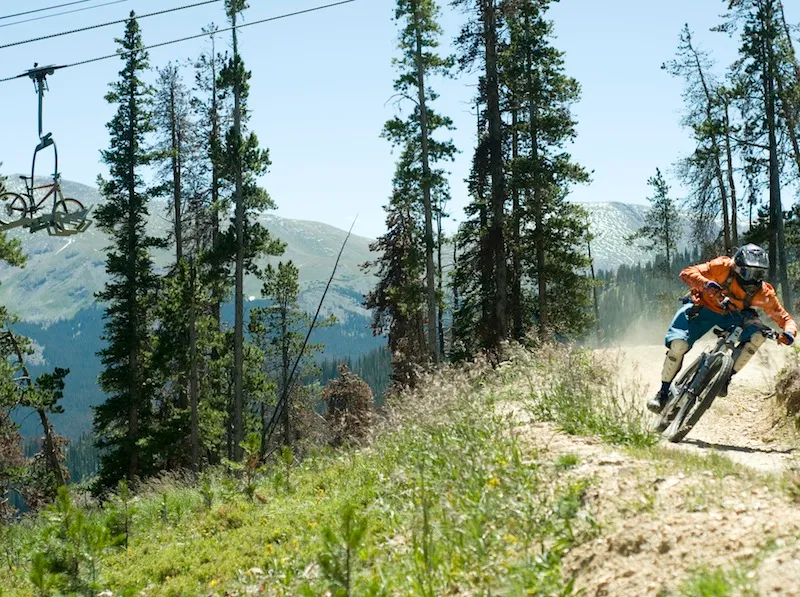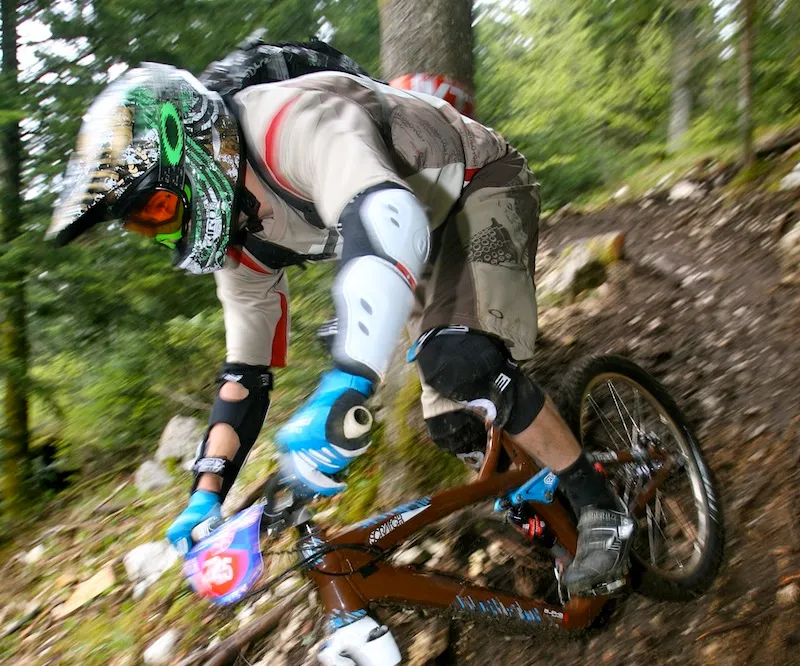This weekend’s Trestle All-Mountain Enduro is not Super D racing; something that Ross Schnell was quick to point that out to BikeRadar. The event, which Schnell is co-promoting, is modeled after European Enduro racing, and pits riders against the clock in a time-trial format over five all-mountain downhill stages, which will run over 19-21 August in Winter Park, Colorado.
The event is a first of its kind in the US and uses the auto rally style format, in which the lowest five-stage time determines the winner. “A lot of people have wanted an event like this for a long time,” Ross Schnell, Trek’s American all-mountain racer and co-promoter of the Trestle All-Mountain Enduro, told BikeRadar. “It’s first finding somewhere to do it, for so many reasons whether it’s the resort, or the terrain, or the liability and all the legal stuff. We landed on Winter Park; they do it and do it well. The resort is close to the front-range and it’s easily accessible and there is ample [reasonably priced] accommodation — there’s just such a cool vibe at that venue.”
Registration is still open and $100 for all five stages, but limited to 200 riders.
Schnell has travelled the US and European Enduro circuits for the better part of four seasons. He’s ridden the good and the bad and carries strong opinions as to what ‘Enduro’ really means. “The races in Europe, because those are the coolest,” said Schnell. “They have huge mass start events and time-trial formats. In the French enduro series they actually combine the two, like at the Enduro of Nations. The Enduro of Nations has 10 stages total; the first 9 are time trial and the final stage is mass start. At some point I would like to do that [at Winter Park], they have plans for trails and more terrain up higher [in the Trestle Bike Park] and you could start one way up, they’ve definitely got big plans to do more of this cool stuff.”
Schnell was adamant that this race is not a compilation of Super Ds. “The format of Super D racing in the US is pretty pathetic, I mean, a two minute fire road with one minute of climbing to running to your bike and stuff, it’s just not that cool,” said Schnell. “And that’s one of the reasons we didn’t call this a Super D race, because we’re trying to evolve it to the proper format of Enduro and make real races that aren’t an afterthought. Most of the Super Ds are blatant afterthoughts to basically make more revenue for the race. What I bring to the table as a racer/ co-promoter is that I know what works and what doesn’t work at a bike race; everything from the course design to the entry fee and what you get from the race, and a lot of times I don’t feel like the racer gets their money’s worth.”
With strong opinions in mind, Schnell did all of the course design for the three days of racing. “ I basically had to lay out the five stages and run them by the resort. They didn’t bounce anything back or change anything; it’s exactly how I envisioned it being; it’s a perfect balance, it doesn’t favor anyone. The first course is the burliest and then there’s some pedaling over the weekend. It’s literally, exactly what I had on tap and they were fully on board with that.”
Schnell’s All-Mountain Enduro will pit riders against the clock at 30-second intervals and won’t feature a mass-start ‘queen’ stage — this year, at least. The first stage, Friday’s chainless downhill will determine start position for the following three stages and accumulated overall time will be used to start the last stage — a 30-40 minute downhill that winds through the whole of the Trestle Bike Park’s 2,000 feet of vertical elevation — fastest go first.
Mind you this isn’t downhill racing, rather, according to Schnell, it’s mountain bike racing on the bikes that people buy to ride trails these days.
“The industry is all for it,” said Schnell. “The equipment that we’re riding in this race is what the average person buys; it’s the natural evolution of the sport, I think, because not everyone has a light weight hardtail or a downhill bike. Just riding at Winter Park last weekend, I saw more trail bikes there than I’ve ever seen, and I had people pull me aside and say, ‘dude this is awesome.’ I had a guy that does triathlons, but owns a trail bike and he’s bringing his family up to do the event. That’s exactly what we wanted from this, because that guy has probably never done a mountain bike race.”

The Trestle Bike Park terrain is perfect for showcasing the capabilities of today's trail bikes
Schnell explained that the number of sponsors and insiders who want to race it better illustrates the enthusiasm for the race. “The people behind the scenes at these companies supporting the race are actually making an effort to come do it, they don’t usually do that,” he said. “And the support that we’re getting for the event is awesome. I don’t have anything to compare it to, but pretty much everything that we’ve needed and asked for to put on a killer event, we’ve gotten.”
Equipment requirements
Schnell recommends a 6in travel trail bike for this race and a couple of sets of tires; true downhill tires for the first four stages and a lighter all-mountain tire for Sunday’s long stage. The format of the race requires rider use the same frame and suspension, including both fork and rear shock, for all of the stages. Wheels and tires are ok to change. Schnell will ride Trek’s new 2012 Slash trail bike for the event with heavy duty tires that weigh 900g a piece. The winner of the race is decided on overall time and a flat will put a rider out of contention for the win. “I don’t want to flat,” said Schnell.
The most important component, according to Schnell, however, will be a dropper seat post. “I would not do this race without the [RockShox] Reverb [height adjust seat post],” said Schnell. “I think it’s the most important piece of my bike. I would rather have my shifting go out than my dropper post fail. It’s not just about going faster, but it’s a safety issue. It’s saved me for sure; it’s highly suggested — if you can convey that — if there’s a chance for people to get one of those posts before the race, it should be a requirement.”
The stages require climbing, but are run on many of the Winter Park resort’s more advanced terrain in the Trestle Bike Park and the resort is requiring riders to wear full-faced helmet for the first four stages of the race. Additional protective equipment is likely a smart choice, since there isn’t extended bouts of climbing.
“It’s basically a liability issue with the resort," said Schnell. "I’m going to race in a full-face helmet, knee pads, because I feel more confident, but having arm and leg pads isn’t really going to slow you down too much, so I suggest just putting some pads on.”
Riders to watch
With US$10,000 up for grabs the pro race will be a hotly contested event. Mark Weir will be racing with his new Cannondale and he’s bringing his young protégé Ben Cruz, and both will be factors in the pro race. Matt Slaven will be racing for Kona and of course, Schnell will throw his own hat into the ring.
“I think there are going to be Colorado riders that come out of the wood work for this, guys that are just killer riders that live up high and are super fit,” said Schnell.
There’s a saying — coined by Mark Weir, among others — in the Enduro scene that you know a course is good when everyone is complaining about it; when the cross-country riders are complaining its too burly and the downhillers are complaining it requires too much pedaling. Who does Schnell think will complain this weekend?
“Yeah, I think people will complain,” said Schnell. “But if the complaints are coming from opposite ends of the spectrum then I did a good job designing the courses. We’re mountain bike racers we’re suppose to be able to do everything.”
